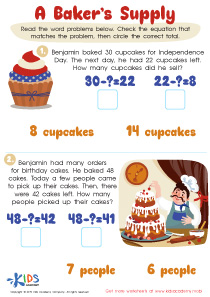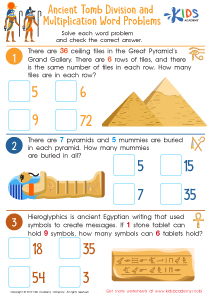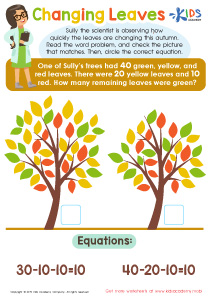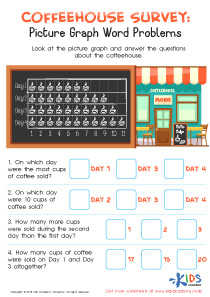Easy Length and Mass Word Problems Worksheets for 6-Year-Olds
1 filtered results
-
From - To
Introducing our "Easy Length and Mass Word Problems" worksheets, expertly crafted for six-year-olds! These educational homework sheets are designed to make learning fun and engaging. Each worksheet combines simple length and mass measurements with delightful word problems, helping young learners develop essential skills in a playful context. Tailored to spark curiosity and enhance understanding, these sheets ensure a solid foundation in basic measurement concepts, critical thinking, and problem-solving. Perfect for home or classroom use, they provide a fantastic way for children to practice and master measurement principles while having a great time!
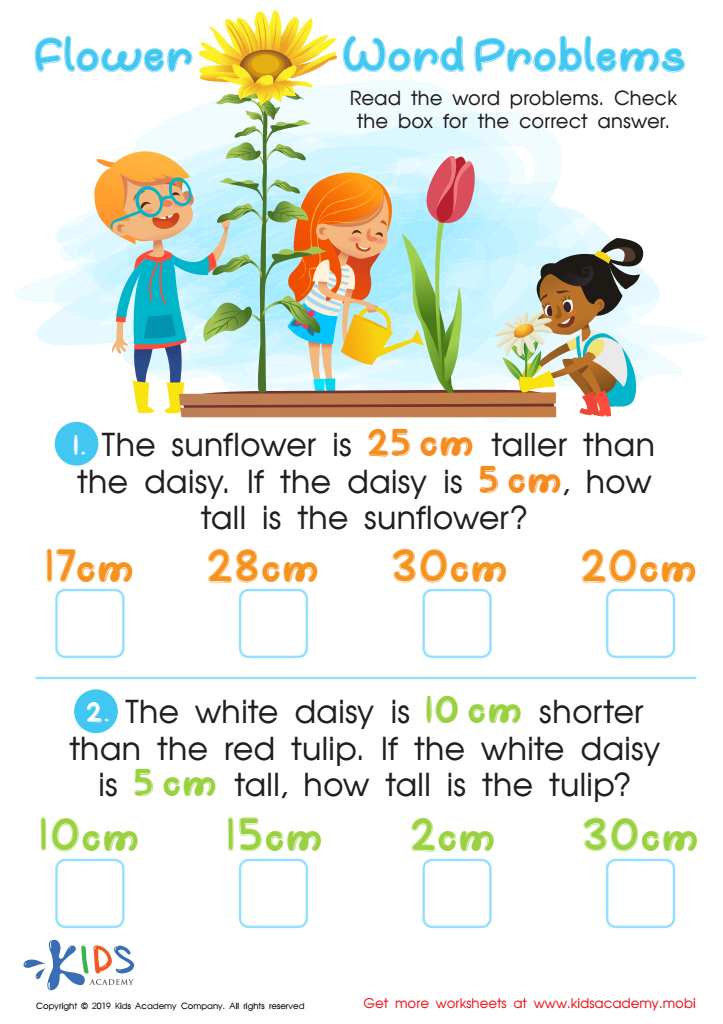

Flower Word Problems Worksheet
Easy worksheets on length and mass word problems are an invaluable resource for children, particularly those around the age of six. These school worksheets are specifically designed to introduce young learners to the basic concepts of measurement, including length and weight, in a fun and engaging way. Here’s why they are so useful:
-
Building a Strong Foundation: At six years old, children are at a critical stage in their educational journey where they are developing foundational skills that will support their academic growth. Length and mass are fundamental aspects of measurement, a key component of early mathematics education. By using school worksheets focused on these topics, children can start to understand how different objects compare in size and weight, which is essential for their cognitive development.
-
Developing Problem-Solving Skills: Easy worksheets on length and mass word problems help children learn to apply their knowledge in practical scenarios. These worksheets often present scenarios where children need to think critically about how to use their measurement skills to solve problems. This not only enhances their mathematical skills but also promotes critical thinking and reasoning, which are invaluable across all subjects.
-
Enhancing Engagement: Children are more likely to learn when they are engaged and find the learning process enjoyable. School worksheets designed for six-year-olds often include colorful graphics, relatable scenarios, and a variety of activities that make learning about length and mass interesting and fun. This increased engagement can make children more enthusiastic about learning and more eager to explore new concepts.
-
Supporting Individual Learning Paces: One of the great advantages of using worksheets is that they allow children to learn at their own pace. In a classroom setting, it can be challenging for teachers to give every student individual attention. Easy worksheets on length and mass provide a way for children to practice and reinforce their learning independently or with minimal supervision, ensuring that they can understand and master the concepts at a comfortable pace.
-
Encouraging Real-World Application: By incorporating everyday examples, such as comparing the heights of different family members or weighing fruits in the kitchen, worksheets make abstract concepts more concrete. This helps children understand why length and mass are important in real-life contexts, enhancing their ability to relate school learning to the world around them.
-
Improving Mathematical Communication: As children work through word problems on length and mass, they also enhance their language skills. They learn to comprehend and follow instructions, describe mathematical scenarios, and express their thoughts more clearly. This dual focus on math and language skills is particularly beneficial for young learners, fostering overall academic progress.
-
Providing Feedback and Assessment Opportunities: Worksheets are not only tools for learning but also for assessment. They can serve as informal checks for understanding, allowing parents and teachers to identify areas where a child might be struggling and need further support. Feedback can be immediate and corrective, promoting a positive learning experience and continuous improvement.
-
Encouraging Parental Involvement: Easy worksheets on length and mass word problems are also excellent tools for encouraging parental involvement in a child’s education. When parents take an active role in helping their children with these worksheets at home, it reinforces learning and shows the child that education is a priority. This involvement can boost the child’s motivation and confidence in learning.
-
Promoting Consistency in Learning: Regular practice is key to mastery in any subject. School worksheets provide a structured format that children can follow regularly. This consistency helps to solidify the concepts being taught and makes learning a habit. By regularly completing worksheets, children can build a steady routine that supports lifelong learning skills.
-
Adapting to Diverse Learning Styles: Not all children learn in the same way. Worksheets can be designed to cater to various learning styles—whether visual, auditory, or kinesthetic—by incorporating different types of activities such as drawing, tracing, or even acting out scenarios. This adaptability makes them a versatile tool in catering to the diverse needs of young learners.
In conclusion, easy worksheets on length and mass word problems are much more than just simple educational tools; they are fundamental building blocks that support a wide range of skills in young learners. They help children grasp important mathematical concepts, develop problem-solving skills, and apply their knowledge in meaningful ways, all while being engaged and motivated. For six-year-olds, these school worksheets not only make learning fun but also set the stage for a strong academic future in mathematics and beyond.
 Assign to the classroom
Assign to the classroom
